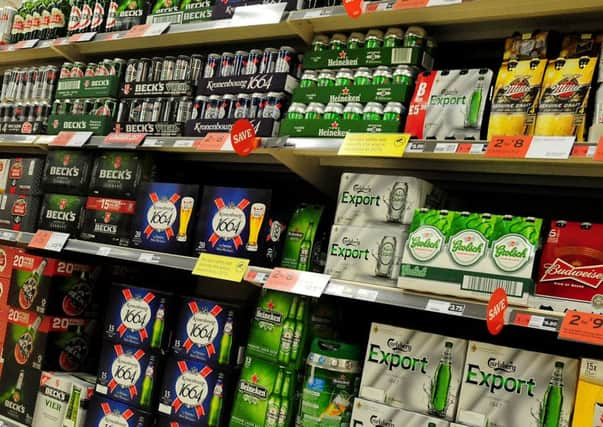Dani Garavelli: Alcohol victory can save us from ourselves


As chief executive of Alcohol Focus Scotland, she had a tough job to persuade wary MSPs that the health benefits it would reap would be worth the inevitable backlash from the drinks industry. But her passion and rigour proved a powerful combination and, after a few setbacks, the Alcohol (Minimum Pricing) (Scotland) 2012 Act was passed, with the minimum price per unit (MPU) set at 50p.
Imagine how disappointed Gillan must have been, then, when the implementation of the policy was scuppered by an appeal from the Scotch Whisky Association (SWA). The case has been wending its way through the justice system ever since, bouncing from the Court of Session to the Court of Justice of the European Union and back again.
Advertisement
Hide AdAdvertisement
Hide AdLast week, however, the country’s top judges ruled in the government’s favour. The SWA had argued the policy, which would impact on cheap imports, breached EU free trade, and suggested raising alcohol taxes instead; but the Court of Session found that, unlike general taxation, an MPU created a direct link between the cost and the strength of the alcohol. Lord Carloway said the policy was designed for the general protection of public health and life and that the government had not contravened European law.
Though the SWA may still appeal to the Supreme Court, the judgment is a victory for campaigners like Gillan and the former chief medical officer Harry Burns, who believed it would cut consumption and the number of deaths caused by cirrhosis and other alcohol-related illnesses.
This is important because Scotland’s relationship with booze isn’t getting any less dysfunctional. Although alcohol sales dipped slightly during the recession, they started to rise again in 2014 and 2015. Last year, they were 20 per cent higher than in England and Wales, with each adult consuming the equivalent of 477 pints of beer, 41 bottles of vodka or 116 bottles of wine a year.
Excessive drinking continues to be one of a web of factors – poor diet, substandard housing, depression etc – that explains why the life expectancy in some urban areas is lower than 70. Heavy drinking takes an economic toll too: the annual cost in Scotland has been estimated at £3.6bn, including: £866m in lost productivity, £269m in health care and £727m in crime.
Those who oppose an MPU on ideological, rather than commercial grounds dismiss it as a tax on the poor. They paint a picture of a beleaguered underclass deprived of one of its few pleasures, while the affluent carry on quaffing. But the beauty of an MPU is that it targets the strongest, cheapest alcohol, disproportionately purchased by the heaviest drinkers, while having little affect on moderate drinkers.
The Sheffield Alcohol Research Group which has carried out extensive research on minimum pricing found that – regardless of income – moderate drinkers bought less than two units of alcohol a week for less than 50p per unit, with those units accounting for less than a third of their overall consumption. In contrast, the heaviest drinkers on low incomes bought 60 units a week for less than 50p per unit with this accounting for 63 per cent of all the alcohol they bought.
One hundred units a week can scarcely be regarded as recreational; any attempt to bring such drinking under control is not intended to penalise society’s most vulnerable, but to improve prospects and increase lifespans.
We already know, from experience elsewhere, that minimum pricing on alcohol can have a positive impact. In Canada, nine out of 10 provinces have adopted the policy in some form. In 2013, an Institute of Alcohol Studies report compiled by experts in the District of Columbia suggested a 10 per cent price increase in average minimum prices would result in a 3-4 per cent decrease in consumption. The same 10 per cent increase was also associated with a 32 per cent reduction in wholly alcohol-caused deaths and a 9 per cent drop in alcohol-related hospital admissions.
Advertisement
Hide AdAdvertisement
Hide AdOf course, there will be those who see an MPU policy as nanny state-ism gone mad . “Typical SNP,” they will say, “always poking their nose into people’s lives.” Such critics will insist change should be wrought through public awareness campaigns alone. But, as a nation, we Scots can be a self-destructive bunch. Sometimes we need saving from ourselves.
Past experience has shown legislation is an effective catalyst for cultural change. The sustained enforcement of existing laws helped render drink-driving socially unacceptable. The ban on smoking in public places helped stigmatise cigarettes. The Scottish Government faced hostility from the tobacco industry and licensees, but the number of smokers decreased and who would go back to the days when you had to push your way through a fug of nicotine to get to the bar and the smell clung to your hair?
Successive Scottish governments have worked hard to tackle alcohol abuse, investing in education, banning multi-buy promotions and bringing in tougher drink-drive limits. The SWA should be ashamed it has prevented a vital piece of the jigsaw being put in place; if it has any sense, it will now accept the verdict and move on.
According to her friend, Lesley Riddoch, Gillan believed the work she undertook at Alcohol Focus Scotland was amongst the most important of her career. While ill, she turned down the offer of an MBE. What better tribute to her efforts than that – four years after it was passed and a year after her death – the Act she fought so hard to secure should finally be implemented?